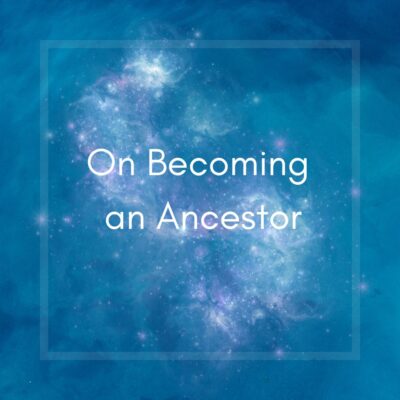June, 2024 ~
As I write this on June 7, 2024, it marks three years since my mother, Mary Jean Jakubowski Gray, died. My Father followed her soon after on August 26, 2021. The amount of time since their passing seems like a very, very long time ago, and, like it was only moments ago. Perhaps the death of both my parents so close together compounded the loss in a way that has altered the time so that it feels both recent and distant. Writing on June 7, 2024, seems particularly auspicious because it is the date of my Spiritual mentor, teacher and friend Tony Lee’s memorial in Australia, and tonight a beloved friend and sister, Nancy Herard Marshall, will be honored in a Fet Kazi Kanari, the traditional ceremony for recently departed in Vodou. My physical body cannot be in all these places at once, so I am here, in my own Ti Kay Miste (“Little Mystery House”), at my Ancestors’ altar, holding vigil and in embodied prayer. I am sitting, breathing and moving the question—how do we become ancestors? How do we grow in relationship to our most recent ancestors? I realize that this is a new relationship with each of these people, and it takes time, like any relationship, to cultivate. It’s a bigger, unique, transformative relationship that, to me, feels like an expanded reciprocity. A global reciprocity that is a multi-dimensional experience of living with this person. Their essences seem to become more than memory, and exist in, above, below and all around us.
When my parents died, I suddenly knew them in my bones and flesh in a way that I can only describe now as embodied memory. My Mom prepared me for this. One of the last things she said to me when I asked her how I could go on without her, was: Don’t worry, honey. You will grow into this new relationship with me. At first it hurts. A lot. People keep telling you to take solace in memories and you must tell them to stop—because at first it really hurts. It’s too soon. But with time, the memories soften and become part of you. It’s hard to describe. They don’t hurt as much and then suddenly they are you; I will become part of you, and then there is pleasure and love in remembering.
How do we learn how to relate to our ancestors when they first become ancestors? So much of the emphasis of someone’s dying is on the loss. And yet we gain a new relationship, an ancestral one. The loss of physical presence and actions and words is real; what about the gain of an ally, friend, beloved in the Spirit realm, or however we believe in ancestry? How do we engage with this relationship with someone in the “ever after”?
After my parents died I began to consciously “work on” our new relationship. I built an altar that remains, shifting and moving things to honor their birthdays and death days and holidays. I prayed to and for them through their Bardo, and practiced timely and meaningful rituals from my own traditions. And, I listened. Listened for ways they might show up, as they began to in dreams and breezes, butterflies and feathers. Or a moment of sudden recognition of their voice, speaking a few relevant and helpful words, in and around me at the same time.
No relationship is finite; it is a process and a moving river of time, past memory and memories in creation in the present. This infinity extends to relationships with the dead. Grief and loss are often treated or described phasically, with a timeline that leads to ease and some sort of closure. This does not make sense to me. The growth of a new and unique relationship does, so as my Ancestor friends gather on “the other side”, I reflect daily on how we continue to relate. I am finishing writing this newsletter on June 18; Tony Lee’s first birthday as Ancestor, a perfect day to celebrate a dear friend.
